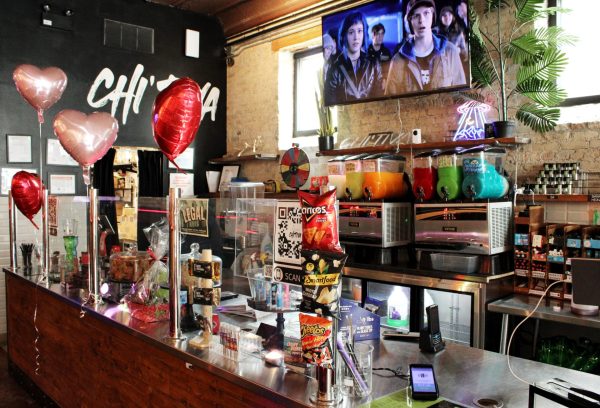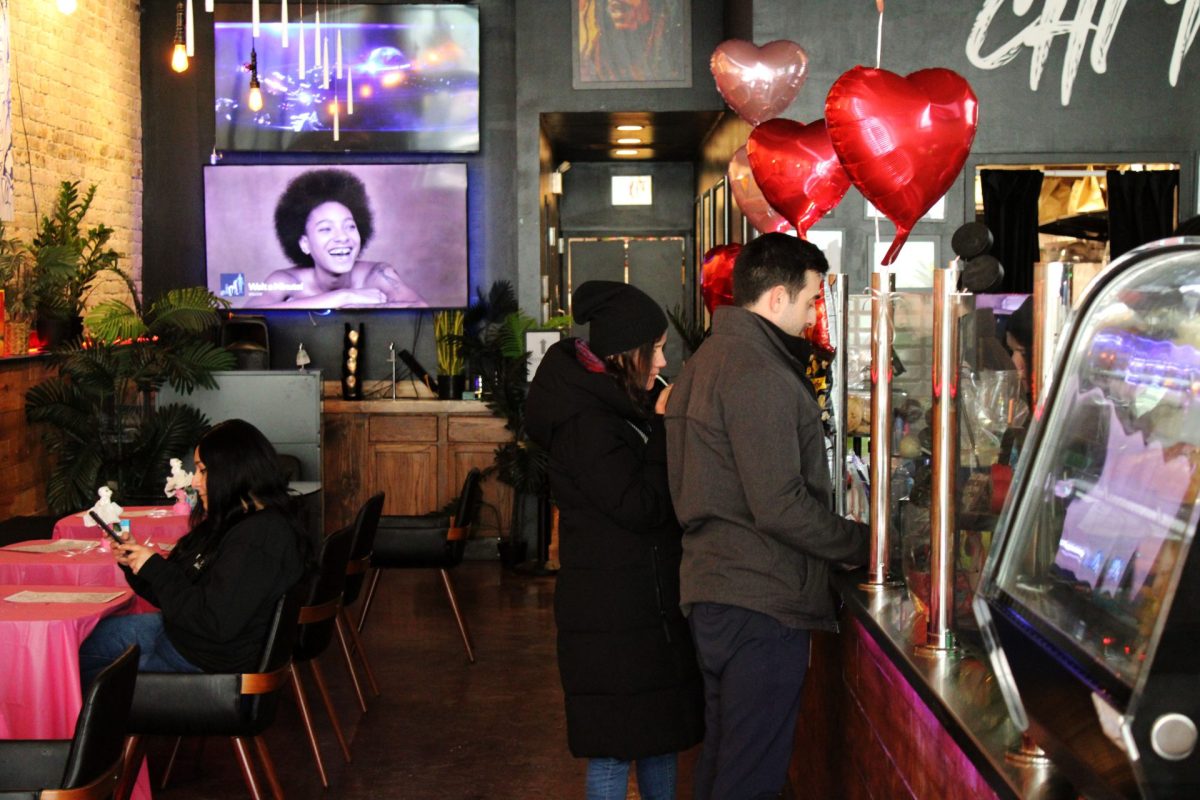Social stoners in Chicago are bringing the sesh out to the cannabis lounges that are popping up in various parts of the city, now that they’re allowed. Imagine Kitty and Red Forman’s basement in “That 70’s Show,” but legal and only public to those age 21 or older — with low lighting and smoky haze wafting around the room.
When Charles Wu looked at the cannabis market in Illinois, he saw dispensaries, where customers are heavily vetted and cannot open their product until they are a certain distance away from the premises. While those precautions are necessary, Wu concluded, “That’s not fun.”
So he founded Chi’Tiva cannabis lounge in 2022, located in Chicago’s Bucktown neighborhood. Wu said the core elements of Chi’Tiva are “inclusivity … and a good time all wrapped around responsibility,”
Wu was not the only one who opened such a venue. Prohibition Cafe, The Sesh Bus, Wake N’ Bakery — all opened for business within the last five years.
But how are these businesses legal? The 2018 Illinois Farm Bill legalized “derivatives of CBD,” says Benesch cannabis industry associate R. Cole Eastman.
The unintended loophole created by this bill is the psychoactive cannabinoids that can be extracted from hemp. Eastman says that because these products are technically federally legal, “there is no regulatory structure whatsoever.” Hemp-derived THC can even be sold across state lines.

Someone might want a cannabis drink, while their friend wants an alcoholic beverage. Yet another might just want water. In addition to all that, Chi’Tiva also sells packaged products that can be taken home, including pre-rolls, cannabis flower and edibles, since the establishment bars the use of smokeable products on site, per the Smoke-free Illinois Act.
Eastman says that per state law, cannabis businesses need to either be part of a retail tobacco shop or attached to a dispensary, “but there are ways to do it outside of that” such as private clubs or restaurants without smokeable products.
The Illinois Department of Financial and Professional Regulation has created rules regarding what can and can’t be done at a dispensary lounge — they can only sell pre-packaged products, alcohol cannot be sold on premises, IDFPR inspections and facilities must have high-power ventilation systems and non-smoking areas for staff.
Chi’Tiva’s delta-nine products include Tetrahydrocannabinol (THC), so they do produce a more intense high, compared with CBD products, for instance. THC is derived from the hemp plant rather than marijuana; it functions almost the same as the THC found in dispensary products.
The hemp plant contains less than 0.03% THC. Because that small amount is within the legally growable amount in Illinois, products derived this way can skirt the intense regulations of dispensary cannabis.
Wu says the user experience is “the same or very similar.”
Consumption restaurant establishments do not have to jump through the same hoops that a dispensary does. Chi’Tiva is licensed as a restaurant establishment with special approval from the city to consume on-site, meaning the zoning regulations they adhere to are far less restrictive and allow for on-premise use.
Some might expect that hemp companies would prefer to keep their business unregulated, but many owners have pushed for the opposite.
The Illinois Hemp Business Association wrote a letter to Gov. JB Pritzker on behalf of small hemp business owners, including Wu.
“For the last several years, many of our companies have been advocating for strict regulation and taxation of intoxicating hemp products as well as prudent health-safety measures for non-intoxicating CBD products,” the letter said.
Wu fears that with larger marijuana companies expanding into the hemp business, the market will become dominated by big-box companies that do not prioritize safety and regulation in the way small businesses do.
Joseph Kinsella, an anthropology and cannabis studies adjunct professor at DePaul, is also the general manager of OKAY Cannabis dispensary in suburban Evanston. He says he takes a similar approach to building community and destigmatizing cannabis culture.

OKAY Cannabis has three locations — in Chicago’s West Town neighborhood, in Evanston and in Wheeling, a suburb west of Chicago. The Wheeling location also includes a consumption lounge — although it is much more heavily regulated as a dispensary than establishments licensed as restaurants like Chi’Tiva, according to Kinsella.
Each municipality has the authority to regulate marijuana consumption lounges, so this varies from place to place.
At the marijuana lounge in Wheeling, Kinsella said guests can only use products purchased from OKAY Cannabis as a safety precaution. They also are required to stay on site for at least two hours to allow for the impacts to wear off.
Kinsella said all marijuana products also are meticulously counted at each location. “If we are off by even a gram, it has to be reported to the state department,” Kinsella said, referring to the Cannabis Oversight and Regulation Office.
Kinsellae also noted that there are firm rules regarding exactly when and how often customer identification needs to be checked, even when staff needs to be shown on security cameras doing so.
Marijuana dispensaries are not even allowed to advertise with pot leaf imagery. Kinsella says it is written in the legislation that they cannot advertise using “images or cartoons that might attract children.”
When it comes to product safety, Eastman says that dispensary products in almost every state use track-and-trade systems. From the “second the plant is put into a pot until it becomes a packaged flower, gummy, etc. you can trace it all the way back to the mother plants.”
Hemp businesses are not subject to these systems, so for consumers there is more opaqueness regarding the product’s origins, processing and safety testing.
In Springfield, legislation that would create the Hemp Consumers Product Act has stalled. Governor JB Pritzker has embraced the bill, which would put stricter hemp sales regulations in place. Mayor Brandon Johnson has clashed with the governor, arguing that keeping hemp products unregulated and legal would generate much-needed tax revenue for the city.
Related Stories:
- A deadly drug: Whippit use rampant; DePaul professor calls for laws to curb access
- Illinois Senate works towards cannabis reform, equity concerns remain
Support Student Journalism!
The DePaulia is DePaul University’s award-winning, editorially independent student newspaper. Since 1923, student journalists have produced high-quality, on-the-ground reporting that informs our campus and city.
We rely on reader support to keep doing what we do. Donations are tax deductible through DePaul's giving page.


